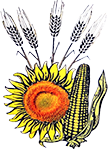Agroeconomic Value of Jerusalem Artichoke Helianthus Tuberosus Cultivars
Victor Țîţei and Serghei Cozari
Grădina Națională Botanică (Institutul) „Alexandru Ciubotaru”
Universitatea de Stat din Republica Moldova
Keywords: biochemical composition, biochemical methane potential, cultivars ‘Maria’ and ‘Solar’, forage quality, Helianthus tuberosus, productivity.
Abstract: Jerusalem artichoke Helianthus tuberosus, belonging to the Asteraceae family is a crop with multiple uses.
The goal of this study was to evaluate some agro biological peculiarities and the quality indices of aerial phytomass and tubers from the local cultivars ‘Maria’ and ‘Solar’ of Helianthus tuberosus. The aerial phytomass was collected during the stage of formation of flower heads and tubers – in autumn, at the end of the growing season.
It was found that the studied cultivars of Jerusalem artichoke, at the mowing time, reached a plant height of 215-290 cm, the phytomass yield was 5.29-8.45 kg/m2 green mass or 1.84-1.92 kg/m2, the dry matter had 35.6-39.0 % leaf content. The dry matter nutrient and feed energy values were: 77-116 g/kg CP, 81-135g/kg ash, 251-297g/kg CF, 292-311 g/kg ADF, 456-485 g/kg NDF, 53-60 g/kg ADL, 239-251 g/kg Cel, 164-174 g/kg HC, 64.7-66.2% DMD, RFV= 124-135, 12.72-12.98 MJ/kg DE, 10.44-10.66MJ/kg ME, 6.46-6.67MJ/kg NEl.
The tuber productivity varied from 2.67 kg/m2 to 3.91 kg/m2, with 32.74-33.71% dry matter. The biochemical composition of the dry matter of tubers: 9.94-10.24% CP, 0.71% EE, 4.77-8.12% CF, 72.90-79.46% NFE, 3.53-4.86 % starch, 55.30-58.29% inulin, 5.12-8.02 % ash, 0.09-0.16% Ca and 0.30-0.32% P with 11.45-12.12 MJ/kg ME.
The Jerusalem artichoke phytomass can be used for anaerobic digestion in biogas plants with biochemical methane potential 298-316 litres/kg organic matter.
The stems of the studied cultivars quickly shed leaves and dehydrate in the autumn-winter period, and can be chopped, milled and used as feedstock for the production cellulosic ethanol and solid bio fuel.
The obtained results indicate the possibility of using the local Jerusalem artichoke cultivars for the creation of plantations as a source of fodder and as feedstock to obtain different products, including renewable bioenergy.
The research was conducted within the project financially supported by NARD, no. 20.80009.5107.02. “Mobilization of plant genetic resources, plant breeding and use as forage, melliferous and energy crops in bioeconomy”.
